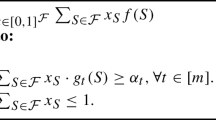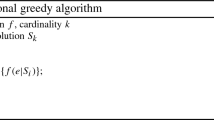Abstract
Maximizing a submodular function has a wide range of applications in machine learning and data mining. One such application is data summarization whose goal is to select a small set of representative and diverse data items from a large dataset. However, data items might have sensitive attributes such as race or gender, in this setting, it is important to design fairness-aware algorithms to mitigate potential algorithmic bias that may cause over- or under- representation of particular groups. Motivated by that, we propose and study the classic non-monotone submodular maximization problem subject to novel group fairness constraints. Our goal is to select a set of items that maximizes a non-monotone submodular function, while ensuring that the number of selected items from each group is proportionate to its size, to the extent specified by the decision maker. We develop the first constant-factor approximation algorithms for this problem. We also extend the basic model to incorporate an additional global size constraint on the total number of selected items.
Similar content being viewed by others
Data Availability
Enquiries about data availability should be directed to the authors.
Notes
A matroid is a pair \({\mathcal {M}} = (V, {\mathcal {I}})\) where \({\mathcal {I}} \subseteq 2^V\) and 1. \(\forall Y \in {\mathcal {I}}, X \subseteq Y \rightarrow X \in {\mathcal {I}}\). 2. \(\forall X, Y \in {\mathcal {I}}; |X| < |Y| \rightarrow \exists e\in Y \setminus X; X \cup \{ e\} \in {\mathcal {I}}\).
References
Biddle D (2017) Adverse impact and test validation: a practitioner’s guide to valid and defensible employment testing. Routledge, Oxfordshire
Buchbinder N, Feldman M, Naor J, Schwartz R (2014) Submodular maximization with cardinality constraints. In: Proceedings of the twenty-fifth annual ACM-SIAM symposium on Discrete algorithms, pp 1433–1452. SIAM
Celis E, Keswani V, Straszak D, Deshpande A, Kathuria T, Vishnoi N (2018) Fair and diverse dpp-based data summarization. In: International conference on machine learning, pp 716–725. PMLR
Celis LE, Huang L, Vishnoi NK (2018) Multiwinner voting with fairness constraints. In: Proceedings of the 27th international joint conference on artificial intelligence, pp 144–151
Chierichetti F, Kumar R, Lattanzi S, Vassilvtiskii S (2019) Matroids, matchings, and fairness. In: The 22nd international conference on artificial intelligence and statistics, pp 2212–2220. PMLR
Das A, Kempe D (2008) Algorithms for subset selection in linear regression. In: Proceedings of the fortieth annual ACM symposium on Theory of computing, pp 45–54
Dueck D, Frey BJ (2007) Non-metric affinity propagation for unsupervised image categorization. In: 2007 IEEE 11th international conference on computer vision, pp 1–8. IEEE
Dwork C, Hardt M, Pitassi T, Reingold O, Zemel R (2012) Fairness through awareness. In: Proceedings of the 3rd innovations in theoretical computer science conference
El-Arini K, Guestrin C (2011) Beyond keyword search: discovering relevant scientific literature. In: Proceedings of the 17th ACM SIGKDD international conference on Knowledge discovery and data mining, pp 439–447
El Halabi M, Mitrović S, Norouzi-Fard A, Tardos J, Tarnawski JM (2020) Fairness in streaming submodular maximization: algorithms and hardness. Adv Neural Inf Process Syst 33:13609–13622
Feldman M, Naor J, Schwartz R (2011) A unified continuous greedy algorithm for submodular maximization. In: 2011 IEEE 52nd annual symposium on foundations of computer science, pp 570–579. IEEE
Golovin D, Krause A (2011) Adaptive submodularity: theory and applications in active learning and stochastic optimization. J Artif Intell Res 42:427–486
Gotovos A, Karbasi A, Krause A (2015) Non-monotone adaptive submodular maximization. In: Twenty-fourth international joint conference on artificial intelligence
Gu S, Gao C, Wu W (2022) A binary search double greedy algorithm for non-monotone DR-submodular maximization. In: Algorithmic aspects in information and management: 16th international conference, AAIM 2022, Guangzhou, China, 13–14 Aug, 2022, proceedings. Springer, pp. 3–14
Joseph M, Kearns M, Morgenstern JH, Roth A (2016) Fairness in learning: classic and contextual bandits. Adv. Neural Inf. Process. Syst. 29
Mirzasoleiman B, Badanidiyuru A, Karbasi A (2016) Fast constrained submodular maximization: personalized data summarization. In: ICML, pp 1358–1367
Monroe BL (1995) Fully proportional representation. Am Polit Sci Rev 89(4):925–940
Shi G, Gu S, Wu W (2021) k-submodular maximization with two kinds of constraints. Discr Math Algorithms Appl 13(04):2150036
Sipos R, Swaminathan A, Shivaswamy P, Joachims T (2012) Temporal corpus summarization using submodular word coverage. In: Proceedings of the 21st ACM international conference on Information and knowledge management, pp 754–763
Tang S, Yuan J (2020) Influence maximization with partial feedback. Oper Res Lett 48(1):24–28
Tang S, Yuan J (2021) Adaptive regularized submodular maximization. In: 32nd international symposium on algorithms and computation (ISAAC 2021). Schloss Dagstuhl-Leibniz-Zentrum für Informatik
Tang S, Yuan J (2022) Group equility in adaptive submodular maximization. arXiv preprint arXiv:2207.03364
Tang S, Yuan J (2023) Beyond Submodularity: A unified framework of randomized set selection with group fairness constraints (Under Review)
Tang S, Yuan J, Mensah-Boateng T (2023) Achieving long-term fairness in submodular maximization through randomization (Under Review)
Tsang A, Wilder B, Rice E, Tambe M, Zick Y (2019) Group-fairness in influence maximization. arXiv preprint arXiv:1903.00967
Zafar MB, Valera I, Rogriguez MG, Gummadi KP (2017) Fairness constraints: mechanisms for fair classification. In: Artificial intelligence and statistics, pp 962–970. PMLR
Funding
The authors have not disclosed any funding.
Author information
Authors and Affiliations
Corresponding author
Ethics declarations
Conflict of interest
The authors have not disclosed any competing interests.
Additional information
Publisher's Note
Springer Nature remains neutral with regard to jurisdictional claims in published maps and institutional affiliations.
Rights and permissions
Springer Nature or its licensor (e.g. a society or other partner) holds exclusive rights to this article under a publishing agreement with the author(s) or other rightsholder(s); author self-archiving of the accepted manuscript version of this article is solely governed by the terms of such publishing agreement and applicable law.
About this article
Cite this article
Yuan, J., Tang, S. Group fairness in non-monotone submodular maximization. J Comb Optim 45, 88 (2023). https://doi.org/10.1007/s10878-023-01019-4
Accepted:
Published:
DOI: https://doi.org/10.1007/s10878-023-01019-4




